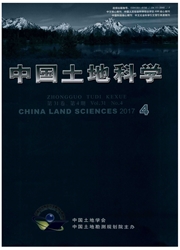

 中文摘要:
中文摘要:
研究目的:以河南省传统农区为例,利用获取农户数据,定量评价农户土地利用行为的生态环境效应。研究方法:参与式农户调查与评估方法(PRA)和生命周期评价方法(LCA)。研究结果:(1)研究区域农户土地利用行为的能源消耗、温室效应、环境酸化和富营养化环境影响指数分别为0.0598,0.0561,1.2530,0.3420,农户土地利用中富营养化和环境酸化对环境影响最大;(2)不同环境影响类型的来源也差异较大,温室气体的排放和能源消耗主要产生于农资生产阶段,富营养化和环境酸化主要来自于种植阶段化肥施用。研究结论:研究尝试从农业生产最基本单位农户体系着手,采用PRA方法获取农户数据,在此基础上进行农户土地利用的LCA评价,测度农户土地利用的环境效应,结果具有较高的可信性,但也存在一定的局限。
 英文摘要:
英文摘要:
The purpose of this paper is to quantitatively assess the environmental impacts of farmer households’ land use behaviors, taking the traditional agricultural area of Henan province as an example. The methods include Life Cycle Assessment(LCA) and Participatory Rural Appraisal(PRA). The results indicate that 1) the environmental impact index of energy consumption, greenhouse effect, acidification and eutrophication were 0.060, 0.056, 1.253, and 0.055 in Traditional agricultural area, respectively. Acidification and eutrophication have the greatest impact on the environment. 2) Sources for different type of environmental impact are also different. Greenhouse gas emissions and energy consumption are generated in the agricultural production stage, eutrophication and acidification mainly from planting fertilizer. The paper concludes that the methods used in the paper may be applied further to estimate environmental impacts of farmers’ behavior, although there are some limitations.
 同期刊论文项目
同期刊论文项目
 同项目期刊论文
同项目期刊论文
 期刊信息
期刊信息
